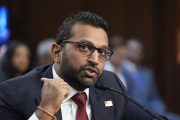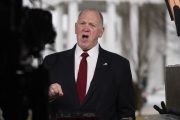
The “shy voter” may be skewing political poll results reported by the mainstream pollsters, according to survey firm CloudResearch. Said lead researcher Leib Litman, “Lately there’s been considerable debate over the accuracy of presidential polls. While recent polls show Joe Biden ahead, a number of pundits speculates that some Donald Trump supporters may be hesitant to share their true opinions when polled by phone.”
Yesterday CNN reported that its “poll of polls” showed Biden leading Trump by eight points. Those polls included results from CNN/SSRS, Quinnipiac University, Grinnell College, and ABC/Washington Post.
CNBC reported the same day on poll results from six “swing states,” claiming that not only does Biden lead Trump in every one (Arizona, Florida, Michigan, North Carolina, Pennsylvania, and Wisconsin), but that President Trump received no post-convention “bounce.”
How is that possible? The New American and other reporting outlets have catalogued Trump’s enormous gains among young black and Hispanic voters; the so-called “enthusiasm” gap between the two candidates in favor of Trump; the five million new gun owners, some of whom no doubt will vote for the president for his pro-gun views; the much stronger “ground game” by the Trump campaign, the increasing number of Democrats leaving their party to vote for Trump; the so-called swing voters continuing to support Trump this year; the Harvard Youth Poll showing “Multicultural Moderates” increasingly supporting the president; the reaction of voters against the violence perpetrated by Antifa and BLM; and the two models (the Primary Model and the S&P 500 Index model) favoring the incumbent.
Part of the answer was uncovered by The New American when we reported that pollster John McLaughlin discovered deliberate “skewing” of mainstream-media poll results by their undercounting of Republicans in their polls. McLaughlin suggested that the results give Biden up to a nine-point advantage over Trump.
So Litman, along with five other researchers from CloudResearch, decided to test for truthfulness in its polling:
To explore this issue, we structured our survey to overcome shortcomings of previous polls. Instead of simply asking voters whom they will vote for — and then ask whether they just lied — we centered our research around a general question: “Are you comfortable in truthfully disclosing the presidential candidate you intend to vote for in a telephone poll?”
Our rationale for this approach was that there’s a major difference between admitting you just lied and admitting to being genuinely concerned about disclosing your preferred candidate.
For the most part, we expected to find very few “shy voters.”
Instead they found that nearly 12 percent of Republicans — one in every eight — said “they would not report their true opinions about their preferred candidate on telephone polls.” By contrast, “just 5.4 percent of Democrats say they’d be reluctant to share their voting intentions.” In addition, and perhaps most importantly, nearly 11 percent of Independents — one in nine — fell into the “shy voter” category as well.
This, wrote Litman, “could have implications in terms of the true accuracy of phone polls … [their less than truthful responses] generates biased poll outcomes.”
CloudResearch followed up by asking why. Here are some of the responses given:
“I don’t believe the information would be confidential and I think it’s dangerous to express an opinion outside of the current liberal viewpoint.”
“Well I probably wouldn’t give my opinion period, but if pushed, I would not give my real opinion for fear of reprisal if someone found out.”
“Because most polls released to the public are slanted and aren’t scientifically based. So, they are messing with the results of the survey from the beginning by knocking down one party or the other. I’m just trying to right the ship.”
“I am hounded day and evening by phone solicitors. They interrupt me all the time; sometimes my irritation takes over, and I don’t answer correctly.”
“My answers could be recorded so I don’t really trust such phone conversations.”
“I do not discuss politics — let alone with a total stranger on the telephone.”
“I don’t always trust phone call surveys. I wouldn’t want to be bombarded with phone calls and political mail.”
“I don’t want my opinion associated with my phone number.”
“I am less anonymous, and somewhat ashamed of my opinion as it is frowned upon.”
The researchers didn’t speculate on how much bias the mainstream polls are giving in favor of Biden, but they did say they were expanding their research into those “swing” states to see if their results nationally can be confirmed at the state level as well.
They included this caveat: “It is important to remember that this is self-report data which may not perfectly align with people’s real world behavior.”
Translation: The bias in favor of Biden might be even worse than CloudResearch discovered.
For the record, Rasmussen, which polls likely voters for its weekly White House Watch, reported on Wednesday:
With less than two months until Election Day, Democratic nominee Joe Biden holds a slight two-point lead over President Trump in the latest Rasmussen Reports’ weekly White House Watch survey.
The new national telephone and online survey finds Biden with 48% support among Likely U.S. Voters to Trump’s 46%. Four percent (4%) prefer some other candidate, while three percent (3%) remain undecided.
A week ago, Biden held a four-point lead following the two national party conventions. The former vice president has bested Trump in every weekly survey since the beginning of July, but this is the first time Trump has edged above 45%.
Image: Thinkstock
An Ivy League graduate and former investment advisor, Bob is a regular contributor to The New American, writing primarily on economics and politics. He can be reached at [email protected].
Related articles:
CNN: Trump Campaign Has “Stabilized”
GOP Pollster Claims Media Polls Are Deliberately Skewed Against Trump




